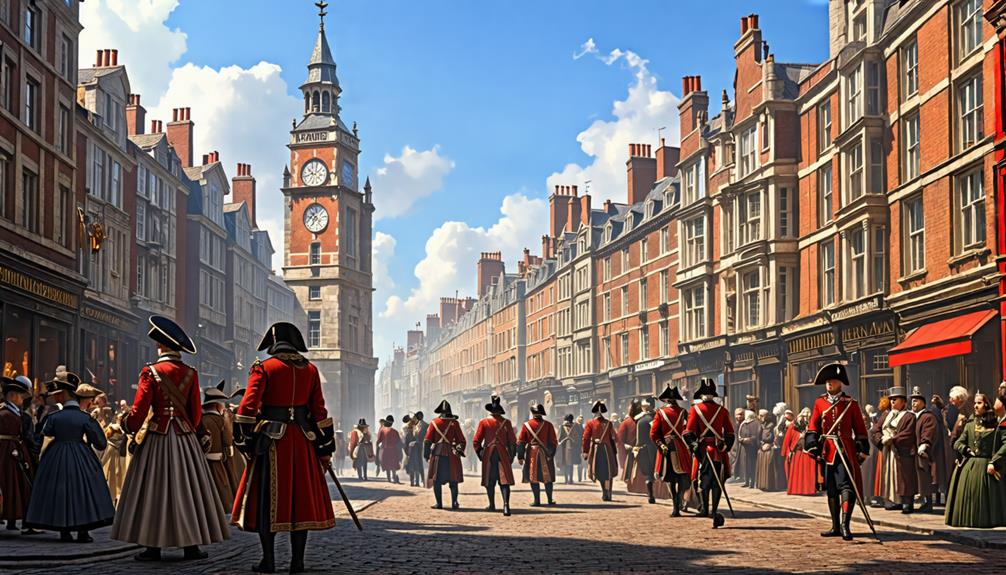In an alternate history, the Royalists emerge victorious in the English Civil War. This outcome would have profound implications for the future of England and the world.
The triumph of the Royalists would mean the preservation of an absolutist monarchy and the suppression of dissent.
How would this change the course of history, shaping the development of individual liberties, representative governance, and global power dynamics?
Royalist Victory Scenario

In an alternate timeline where the Royalists emerged victorious in the English Civil War, the monarchy would have likely solidified its power while diminishing the influence of Parliament.
One theory is that this could have led to a more absolutist form of government, with the King asserting his divine right to rule.
It's possible that a Royalist victory would have meant a crackdown on dissenters and a bolstering of the Church of England's status as the state religion.
While this specific scenario didn't occur in England, similar events took place in other European nations, such as France under Louis XIV's reign.
Negotiated Settlement
A negotiated settlement between the Royalists and Parliamentarians during the English Civil War could have led to a power-sharing agreement, preserving the monarchy while granting Parliament more authority.
Some historians theorize that this might've resulted in a weakened crown and a stronger legislature. It's possible that such a compromise would have spared the nation from years of bloody conflict and political upheaval.
While this scenario didn't occur during the English Civil War, similar compromises have been reached in other conflicts throughout history.
For example, the Glorious Revolution of 1688 saw a negotiated settlement that led to a constitutional monarchy in England, with power shared between the king and Parliament.
Religious Landscape

Had the English Civil War concluded with a negotiated settlement rather than a Parliamentarian victory, England's religious landscape might've developed quite differently. One theory is that this could have led to a more tolerant approach to religious diversity, with the Church of England maintaining its status but allowing greater freedom for dissenting groups.
It's possible that this would have resulted in a more pluralistic and less polarized religious environment in England.
Interestingly, a similar scenario did occur later in history during the Glorious Revolution of 1688-1689, which resulted in the Bill of Rights that granted more religious freedom to non-conformists.
While not identical to a negotiated settlement in the English Civil War, it demonstrates how political compromises can lead to changes in religious tolerance and diversity within a society.
European Power Dynamics
The course of European history might've been significantly different if the English Civil War had an alternative outcome. One possibility is that absolutism could have become the dominant form of government, with monarchs exercising unconstrained authority over their subjects. This might've led to heightened religious tensions and conflicts, as different monarchs sought to impose their faith on their realms.
Another potential consequence is that ideas of individual liberty and representative government may not have taken root in Europe. These concepts, which emerged in part due to the English Civil War and subsequent events like the Glorious Revolution, could have been suppressed under absolutist regimes. It's worth noting that similar scenarios did occur to some extent in other parts of Europe, such as in France under Louis XIV's reign.
The long-term impacts of this alternate history are open to speculation. Some theorize that Europe could have seen a very different balance of power, with certain nations becoming more dominant while others were weakened. There's also the question of how this would have affected the colonization of the Americas and the rise of European empires overseas.
Colonial Implications

If Britain's approach to colonizing the Americas was shaped by an absolutist monarchy, the resulting colonial rule could have been more authoritarian and exploitative. One theory is that indigenous populations would have faced even harsher subjugation under this alternate scenario.
It's possible that the seeds of representative government and individual rights may not have been planted in the Americas.
However, if this type of colonial rule did occur at a later date by another European power, it could have meant changes to the political and social landscape of the region.
Long-term Political Consequences
In an alternate history where Parliament didn't prevail in the English Civil War, the political landscape of England could have developed quite differently. One theory is that an absolute monarchy might've become entrenched, potentially limiting the growth of representative government and individual rights. It's possible that constitutional principles and the rule of law would have evolved more slowly or not as extensively.
Another view is that without checks on royal power, there would have been a greater risk of tyranny, oppression, and abuse of authority by the monarchy. While we can't know for certain, these factors could have significantly altered England's political trajectory and national identity in the centuries that followed.
It's worth noting that similar conflicts between monarchs and representative bodies occurred in other European nations like France in the late 18th century. So even if this particular alternate scenario didn't play out in England in the 1600s, some of these themes and tensions emerged elsewhere later on, shaping the course of other societies.
Conclusion
As you ponder this alternate path, it's clear that a different outcome in the English Civil War would have profoundly reshaped the nation's destiny.
The ripple effects would have touched every aspect of life, from the halls of power to the humble parish church.
England's place on the global stage, too, would have been forever altered, her influence cast in a new light.
The very fabric of history would have been rewoven, thread by thread.

Leave a Reply